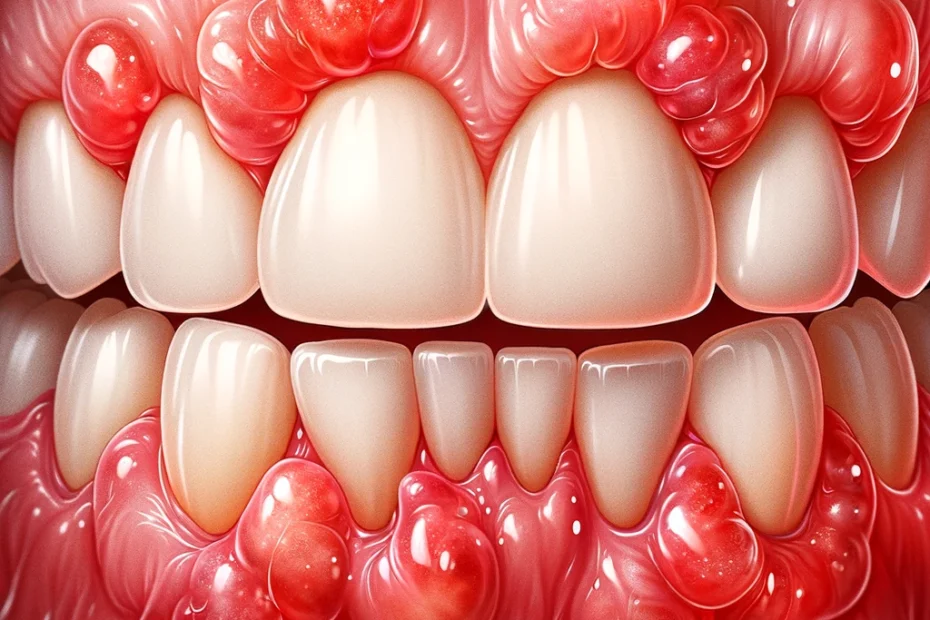Gingivitis is an inflammatory condition of the gums characterized by redness, swelling, and bleeding. It is a common ailment that can affect individuals of all ages but is often preventable and treatable with proper care. Sometimes, gingivitis can manifest as bumps on the gums, which are areas of localized swelling caused by inflammation or infection
Understanding gingivitis is crucial as it is the initial stage of periodontal disease, which, if left untreated, can lead to more severe oral health issues. Early intervention can prevent the progression to more severe conditions that can impact overall health and lead to tooth loss.
Understanding the Causes of Gingivitis
The primary cause of gingivitis is plaque accumulation on the teeth. Plaque is a sticky film composed of bacteria, food particles, and saliva that forms on the teeth. When plaque is not removed through regular brushing and flossing, it hardens into tartar, which irritates the gums and leads to inflammation.

The bacterial toxins and the body’s response to these toxins cause the gums to become inflamed, swollen, and more likely to bleed. Regular dental hygiene practices can prevent the buildup of plaque and tartar, significantly reducing the risk of gingivitis.
Early Signs and Symptoms
Early signs of gingivitis include gum redness, swelling, and bleeding, especially during brushing or flossing. Other symptoms may involve bad breath, receding gums, and tenderness. Recognizing these signs early is vital for preventing the progression of the disease.
- Gum redness indicates the beginning of inflammation, while swelling suggests that the body is reacting to bacterial infection.
- Bleeding gums, often noticed during routine brushing or flossing, are a clear indicator that the gums are not healthy.
- Bad breath, or halitosis, can result from the bacterial activity in the mouth. Receding gums expose more of the tooth’s surface, making the teeth appear longer and increasing sensitivity.
- Tenderness in the gums can make eating and oral hygiene practices uncomfortable, discouraging proper care and exacerbating the condition.
Diagnosing Gingivitis: What to Expect
Diagnosing gingivitis involves a thorough dental examination. The dentist will check for plaque and tartar buildup, assess gum inflammation, and measure the depth of the pockets around the teeth. X-rays may also be taken to evaluate bone loss. Early diagnosis is key to effective treatment and management.
Risk Factors for Developing Gingivitis
Several factors increase the risk of developing gingivitis, including poor dental hygiene, smoking, hormonal changes, certain medications, and underlying health conditions like diabetes. Understanding these risk factors can help in taking proactive measures to mitigate them.
Complications of Untreated Gingivitis
If gingivitis is left untreated, it can progress to periodontitis, a more severe form of gum disease. This condition involves the deeper structures supporting the teeth, leading to the destruction of the bone and tissues that hold the teeth in place. Over time, the gums pull away from the teeth, forming pockets that become infected. The body’s immune response to this infection, combined with bacterial toxins, starts to break down the bone and connective tissues. This deterioration can eventually cause tooth loss, as the teeth lose their foundational support and become loose.
Additionally, there is growing evidence linking gum disease to systemic conditions such as heart disease and diabetes. Chronic inflammation from periodontal disease can contribute to the development of cardiovascular problems.
Bacteria from the mouth can enter the bloodstream, leading to inflammation in blood vessels and increasing the risk of heart attack and stroke. Moreover, individuals with diabetes are more prone to infections, including gum disease, and untreated gingivitis can make it more difficult to control blood sugar levels. This bidirectional relationship highlights the need for maintaining optimal oral health to support overall well-being.
Effective Treatment and Preventive Measures for Gingivitis
Treatment for gingivitis focuses on eliminating the plaque and tartar causing the inflammation. This often involves professional dental cleaning, known as scaling and root planing, to remove tartar from above and below the gumline. Scaling removes plaque and tartar from the tooth surfaces, while root planing smooths the root surfaces to promote healing and prevent further bacterial buildup. In more severe cases, medications such as antibiotic gels or mouth rinses may be prescribed to reduce bacterial load. Surgical interventions, such as flap surgery or bone grafts, might be necessary for advanced periodontitis to restore supportive tissues.
Preventive Measures
Maintaining good oral hygiene is the most effective way to prevent gingivitis. This includes brushing at least twice a day with fluoride toothpaste, flossing daily, and using an antimicrobial mouthwash.

- Proper brushing techniques ensure the removal of plaque from all tooth surfaces, while flossing helps clean between teeth where toothbrushes can’t reach.
- An antimicrobial mouthwash can reduce bacteria in the mouth, adding an extra layer of protection against gingivitis.
- Consistent oral care routines help in removing plaque and preventing tartar buildup, thereby reducing the risk of gum inflammation.
Preventing gingivitis involves adhering to a comprehensive oral care routine, regular dental visits, and lifestyle changes.
- Regular dental checkups and cleanings allow for early detection and treatment of any gum issues, preventing them from worsening.
- Quitting smoking is crucial as tobacco use significantly increases the risk of gum disease.
- Managing stress can also contribute to better oral health, as stress can weaken the immune system and exacerbate gum problems.
Maintaining a balanced diet rich in essential nutrients supports overall health and strengthens the immune system, which is vital for preventing infections.

- A nutrient-rich diet plays a crucial role in maintaining oral health. Foods high in vitamins C and D, calcium, and antioxidants support gum health and help in preventing gingivitis.
- Vitamin C is essential for collagen production and gum tissue repair, while vitamin D aids in calcium absorption, strengthening teeth and bones. Calcium is crucial for maintaining the structural integrity of teeth and bones.
- Antioxidants found in fruits and vegetables help reduce inflammation and fight off infections.
- Limiting sugar intake is also essential as it reduces the risk of plaque formation. Sugary foods and drinks provide a breeding ground for bacteria, leading to increased plaque and tartar buildup.
By combining effective treatment options with preventive measures, individuals can effectively manage and prevent gingivitis, ensuring long-term oral health and overall well-being.
Gingivitis Treatment at Home
Gingivitis can often be managed and treated at home with natural remedies that focus on improving oral hygiene and reducing inflammation. Here are five effective natural remedies:
- Salt Water Rinse: Rinsing your mouth with a saltwater solution can help reduce inflammation and kill bacteria. Mix half a teaspoon of salt in a glass of warm water, swish it around your mouth for 30 seconds, and spit it out. Repeat this twice daily.
- Oil Pulling: This traditional practice involves swishing a tablespoon of coconut or sesame oil in your mouth for 10-15 minutes. Oil pulling helps reduce plaque and bacteria, promoting healthier gums.
- Aloe Vera Gel: Aloe vera has natural anti-inflammatory and antibacterial properties. Apply a small amount of pure aloe vera gel directly to the gums and leave it on for about 30 minutes before rinsing. Repeat this a few times a day.
- Tea Tree Oil: Known for its powerful antimicrobial properties, it can help reduce gum inflammation and fight bacteria. Add a drop of tea tree oil to your toothbrush or mix a few drops with water to create a mouthwash. Be sure to spit it out, as tea tree oil should not be swallowed.
- Turmeric Paste: Turmeric contains curcumin with strong anti-inflammatory and antimicrobial properties. Make a paste by mixing turmeric powder with a small amount of water or coconut oil. Apply the paste to your gums, leave it on for 10-15 minutes, and then rinse thoroughly. Use this remedy twice a day for best results.
Myths and Misconceptions About Gingivitis
Several misconceptions about gingivitis need to be addressed for better awareness and prevention.
- One common myth is the belief that gingivitis only affects older adults. In reality, gingivitis can occur at any age, and it is especially prevalent during adolescence due to hormonal changes.
- Another misconception is that bleeding gums are normal, especially during brushing or flossing. While occasional minor bleeding might occur, consistent bleeding is a sign of gum inflammation and should not be ignored.
- Many people also think that if they don’t experience pain, their gums are healthy. However, gingivitis can be painless in its early stages, which is why regular dental checkups are crucial for early detection.
The Link Between Gingivitis and Systemic Health
Research has shown a connection between oral health and overall health. Gingivitis and periodontitis have been linked to conditions such as cardiovascular disease, diabetes, and respiratory infections. The chronic inflammation associated with gum disease can have systemic effects, influencing the health of the entire body. For example, the bacteria responsible for periodontal disease can enter the bloodstream and cause inflammation in other parts of the body, contributing to the development of atherosclerosis (hardening of the arteries). This can increase the risk of heart attacks and strokes.
For individuals with diabetes, managing gum disease is particularly important. The inflammation and infection associated with gingivitis can make it harder to control blood sugar levels, creating a vicious cycle of worsening diabetes and periodontal disease. Additionally, there is evidence suggesting that pregnant women with severe gum disease are at a higher risk of premature birth and low birth weight babies.
Conclusion:
Maintaining oral health requires a commitment to good hygiene practices, a healthy diet, and regular dental visits. By understanding and addressing the causes and symptoms of gingivitis, individuals can enjoy healthier gums and overall well-being.

Dr. Orion Johnson is a dedicated and compassionate dentist committed to providing exceptional dental care to his patients.Dr. Johnson obtained his Doctor of Dental Surgery (DDS) degree from a prestigious dental school, where he excelled academically and clinically. He is licensed to practice dentistry and stays updated with the technology through continuing education and training.
